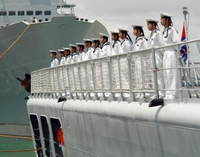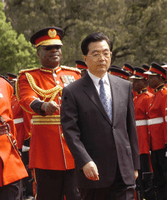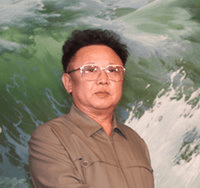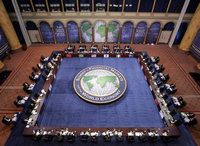Gotta say this about the Chinese: They learn from past mistakes quickly. In 2003, they were largely opaque about SARS and blocked WHO aid to Taiwan. In 2008, they were already much more transparent about the Sichuan earthquake. Today, in the face of the swine flu scare, they’re signaling openness to Taiwanese participation in an upcoming WHO governing assembly. That reflects improvements in cross-straits relations over the past year. But it also demonstrates a steep learning curve in terms of public diplomacy.
China Archive
Free Newsletter
First thing I thought after catching John Woo’s new mega-period epic, Red Cliff, this weekend was, I wonder why I haven’t read any clever blog reviews discussing the film’s obvious subtext on America’s recent military adventurism yet. A few google searches later and I learned that the film not only hasn’t yet been released Stateside, it’s got no U.S. distributor. That, folks, is crazy. Either someone in Hollywood is really stupid, or someone in China is really greedy. (With regard to this movie, I mean.) To put it very simply, this is a great martial arts war flick, with a […]
I didn’t plan to write three China posts today, in case you’re wondering. And I also didn’t plan the title tie-ins. Go figure. Anyway, I thought I’d flag two Times of India items I came across yesterday. First, Vietnam will be purchasing six Russian subs. Second, India has reportedly decided to exclude China from this year’s Indian Ocean Naval Symposium. In case you’re wondering what Vietnam needs six subs for, or why India might be feeling a bit edgy, go read Richard Weitz’ WPR column on China’s naval buildup. In addition to the prestige factor that comes of parading the […]
As I mentioned in the previous post, China’s hole card is its cash reserves. And as this NY Times article on China’s dealmaking in South America makes clear, in a time of global economic distress, that’s still a pretty sweet hole card: In recent weeks, China has been negotiating deals to double adevelopment fund in Venezuela to $12 billion, lend Ecuador at least $1billion to build a hydroelectricplant, provide Argentina with access to more than $10 billion inChinese currency and lend Brazil’s national oil company $10 billion.The deals largely focus on China locking in natural resources like oilfor years to […]
Looking for a respite from the “China’s Rise” trope? You could start with this post by Chris Devonshire-Ellis at 2point6billion.com comparing China’s statism to India’s chaotic democracy: Elsewhere, China’s issues appear to stem from the difficulties thecountry now faces in managing itself as a one-party state. Make nomistake, this is not an easy thing to do . . . [T]o remain benign [and]committed to development, economic progress and integration with theglobal community while utilizing such a system has never been attemptedbefore. People forget; while China may appear to have been stable overthe past three decades, the Chinese social experiment still […]

The Chinese Navy held a birthday party last week, and everybody came. Military observers from around the world attended the April 23 celebrations marking the 60th anniversary of the People’s Liberation Army Navy (PLAN), held at the northern port city of Qingdao. The Chinese government put on a lavish display, showcasing 25 warships — ranging from nuclear submarines to a modern amphibious assault craft to an enormous hospital ship — along with 31 naval aircraft. Twenty-one ships from 14 foreign navies also joined the parade. The four-day commemoration included seminars on maritime security issues, a sampan race, and an at-sea […]

Several analysts have noted that China is leveraging the global financial crisis to increase its economic clout — for example, by going on a commodities “shopping spree,” contributing $40 billion to the International Monetary Fund at the G-20 summit, and pushing for a greater voice in reforming international economic institutions. Recent developments, however, suggest that it is going further. China is using the crisis to step back and consider how it can rise in a more sustainable manner. That move is borne not only of its desire to be a world power, but also of its recognition that its strategy […]

The tiny desert town of Abeche, in eastern Chad, offers a curious sight: Sandwiched between the mud huts that most people call home and the compounds belonging to international aid workers is a humble Chinese restaurant catering to Chad’s growing population of Chinese engineers and managers. Significantly, no equivalent American-style restaurant is to be found. The same holds true across the resource-rich, institution-poor developing world, in countries as remote as East Timor and as dangerous as Somalia. While much of the military establishment in Washington continues to plan for a possible conventional war with China, Beijing is studiously avoiding a […]
The current global financial crisis is unique in that, unlike most previous crises — which started in the periphery of the world economy, and whose deep and long-lasting impacts were limited to isolated parts of the globe — today’s crisis is rooted in Wall Street, at the heart of the globalized market, from where it has grown and spread worldwide. As a result, powerful, globalized economies have taken the first and hardest punches. Although still a bit groggy, they are now struggling to get back on their feet. But while economists discuss how and when economies will emerge from this […]

The United Nations Security Council (UNSC) capped a week of tough negotiations yesterday over a response to North Korea’s April 5 launch of a multi-staged rocket. In a strongly worded statement, this month’s UNSC president, Mexican Ambassador Claude Heller, termed the launch a “contravention” of UNSC Resolution 1718, which forbids the Democratic People’s Republic of Korea (DPRK) from engaging in missile-related activities. The government of the DPRK claimed the launch was meant to place a communications satellite into orbit. However, no one outside North Korea has spotted the alleged satellite. Since the technologies used for space rockets and long-range ballistic […]

As the world economy stares down the most severe crisis it has seen in nearly a century, the International Monetary Fund (IMF) finds itself positioned somewhere between danger and opportunity: Danger lurks in emergent alternatives to the fund; opportunity lies in reform. Yet, reform requires change, and change does not come easily in the realm of international politics. Invariably, it creates winners and losers. The United States and Europe have long been the beneficiaries of the international financial institutions crafted during the waning hours of World War II. But the world of today is a far cry from that of […]
Following up on the discussion of regional strategic balance in Asia, this article on Indian-Chinese maritime rivalry in the Indian Defense Review is essential reading. The IDR is often an outlet for the Indian military’s extreme nationalist wing, but this particular article takes an objective analytic approach to the subject that’s well worth a close read. Significantly, the U.S. is trying to wrap up wars in the Middle East andSouth Asia that have increasingly transformed our operational capacityinto a ground-based force of occupation, at the very moment when theemerging strategic focus of just about all of the world’s majormilitary braintrusts […]
More smart stuff from Sam Roggeveen, who points out that alert is not the same thing as alarmed, but nevertheless admits to a case of nerves: The thing to remember is that China does not have to match the U.S.in global capability terms for U.S. allies in the Pacific to startgetting nervous about the strategic balance. All China has to do is bea credible competitor in the region, and that is already the case. Roggeveen goes on to argue that “. . . we have already passed the point at which the U.S. could militarily intervene in a Taiwan conflict […]
Sam Rogevveen and Rory Medcalf offer some thoughts over at the Interpreter on what the recently announced U.S. defense budget looks like from an Australian perpsective. Here’s Roggeveen: . . . [T]o the extent that Gates has decided to cap America’s ‘big war’ capabilities — by cuttingprograms like the F-22 and the Zumwalt-class destroyers and slowlyreducing the number of aircraft carriers — he is signaling that the U.S.is not intending to increase America’s margin of superiority againstChina. Indeed, given the leaps China is making, he is effectivelychoosing to reduce that margin. It’s really not that surprising or radical — the […]

Andrew Bast’s accompanying interview with Simon Johnson, former chief economist of the IMF and currently a professor atMIT and editor of the Baseline Scenario blog, can be found here. Low expectations preceded last Thursday’s G-20 summit in London, but by day’s end a curious consensus had emerged. Prior to the summit, a rift had emerged between the United States, which was pushing for more economic stimulus, and the Europeans, who urged stricter regulation reforms. French President Nicolas Sarkozy had even threatened to walk out were he not satisfied with the measures taken. (Asked about it upon landing in London, he […]

Perhaps the most significant development coming out of last week’s G-20 summit meeting in London is the news that the world’s leading economies will triple the International Monetary Fund’s lending powers to some $750 billion. The massive investment raises an immediate question: How is influence shifting within the workings of the Fund? To tease out the nuances of these developments, WPR columnist Andrew Bast spoke with Simon Johnson, chief economist of the IMF in 2007 and 2008, and currently a professor at the MIT Sloan School of Management. Many consider Johnson’s blog, The Baseline Scenario, a must-read on the global […]
When the government of South Africa denied the Dalai Lama an entry visa last week, it was not the first time it had snubbed him. In 1999, then-President Mbeki canceled a meeting with the Tibetan leader after the Chinese vehemently protested. Whatever backbone Mbeki may have at one time had when working against apartheid seems to have turned to jello on that occasion. The South African government claimed that last week’s episode was not a snub, but merely an attempt to keep any ensuing diplomatic incident from deflecting attention from next year’s World Cup. But it’s hard to see the […]
